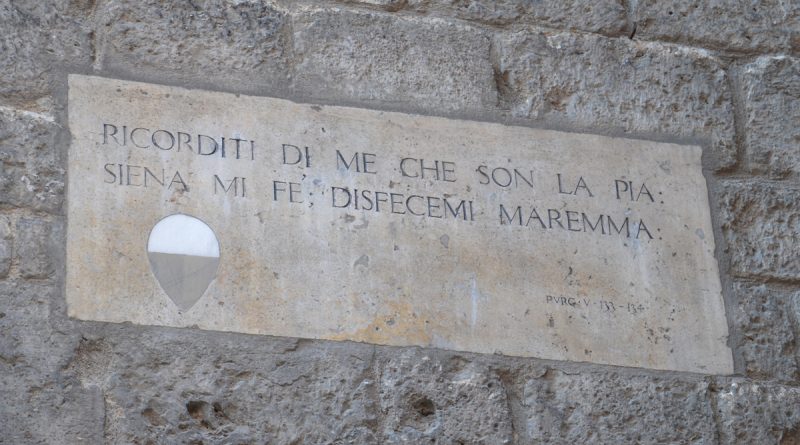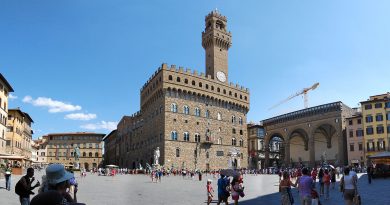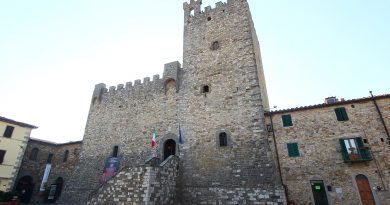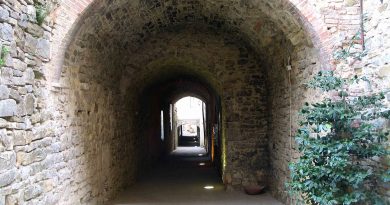Stones of the Divine Comedy (Siena)
In the historic center of Siena there are eight stones that show some passages of Dante’s Divine Comedy, there is in fact a real link between the verses engraved on them and the place where they are. These stones were affixed in 1921, on the occasion of the 600th anniversary of the poet’s death.
The quotations concern the cantos of Hell for the first two, while the other six contain extracts from Purgatory.
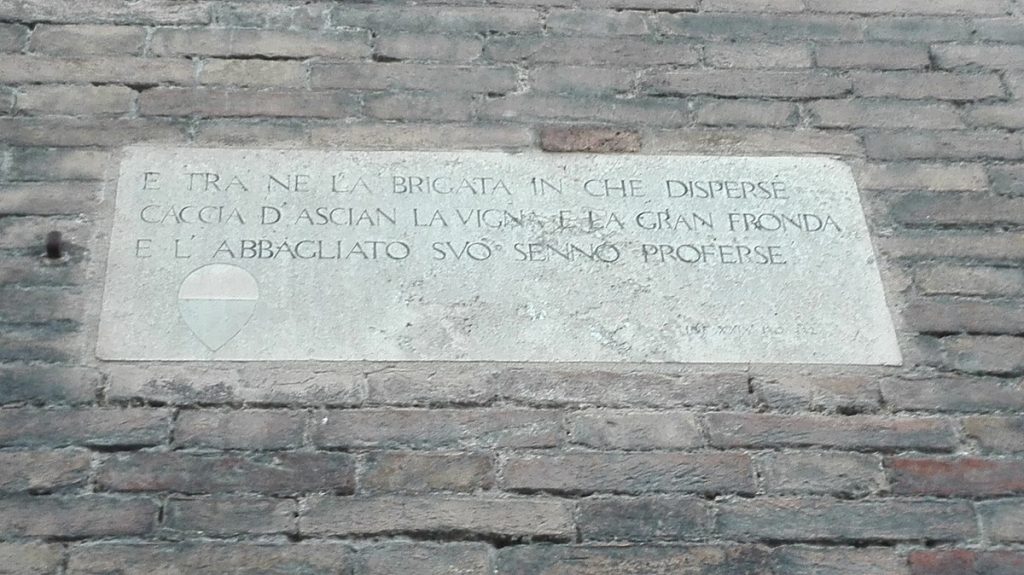
On the first stone we can read:
e tra’ne la brigata in che disperse
Inferno XXIX, vv. 130-132
Caccia d’Ascian la vigna e la gran fonda,
e l’Abbagliato suo senno proferse.
and, too, Caccia d’Asciano’s company,
Hell XXIX, vv. 130-132
with whom he squandered vineyards and tilled fields,
while Abbagliato showed such subtlety.
Dante speaks about a group of young Sienese, all of noble extraction, who around 1270 met themselves in this palace, known as the Casa della Consuma. Their aim was to waste all their money, about 216 thousand florins. The group was recognized under the name of Brigata Spendereccia.
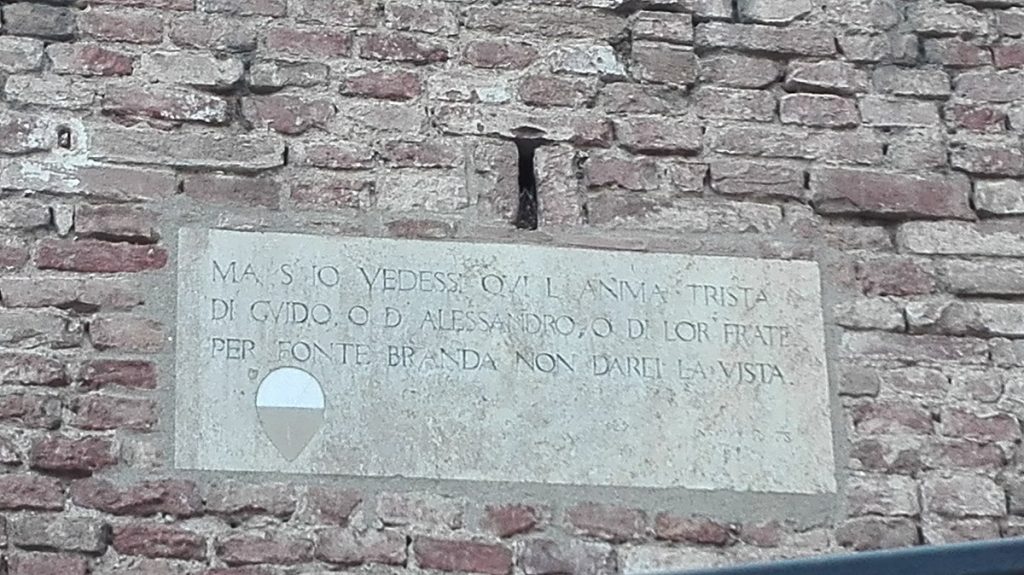
On the second stone we can read:
Ma s’io vedessi qui l’anima trista
Inferno XXX, vv. 76-78
di Guido o d’Alessandro o di lor frate,
per Fonte Branda non darei la vista.
But could I see the miserable souls
Hell XXX, vv. 76-78
of Guido, Alessandro, or their brother,
I’d not give up the sight for Fonte Branda.
Dante arrives in the forger’s bedlam and here he hopes to find the Counts Guido II (mayor of Siena in 1283) and Alessandro di Romena, protagonists of an episode in which they induced Mastro Adamo to forge a gold florin for them. In order to find them, the poet writes that he is willing to give up drinking Fontebranda’s water even if he is thirsty.
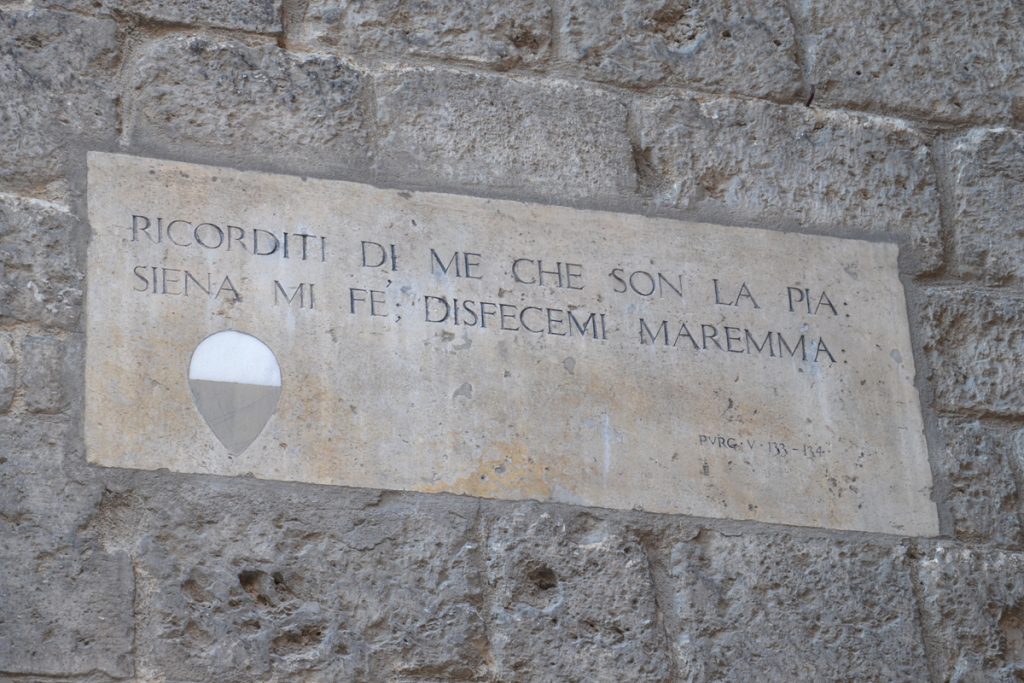
On the third stone we can read:
«ricorditi di me, che son la Pia;
Purgatorio V, vv. 133-134
Siena mi fé, disfecemi Maremma:
“may you remember me, who am La Pia;
Purgatory V, vv. 133-134
Siena made — Maremma unmade — me:
Dante remembers Pia de’ Tolomei: this plaque is in fact located at Palazzo Tolomei. Pia de’ Tolomei lived in 1200 and married Nello dei Pannocchieschi, but according to the legend her husband let her die in Maremma accusing her of treason. The history of this woman is also connected to the Ponte della Pia, which is located near Sovicille (Siena).
The verses report a wish expressed by Pia to the poet: she asks him to remember her in his prayers.
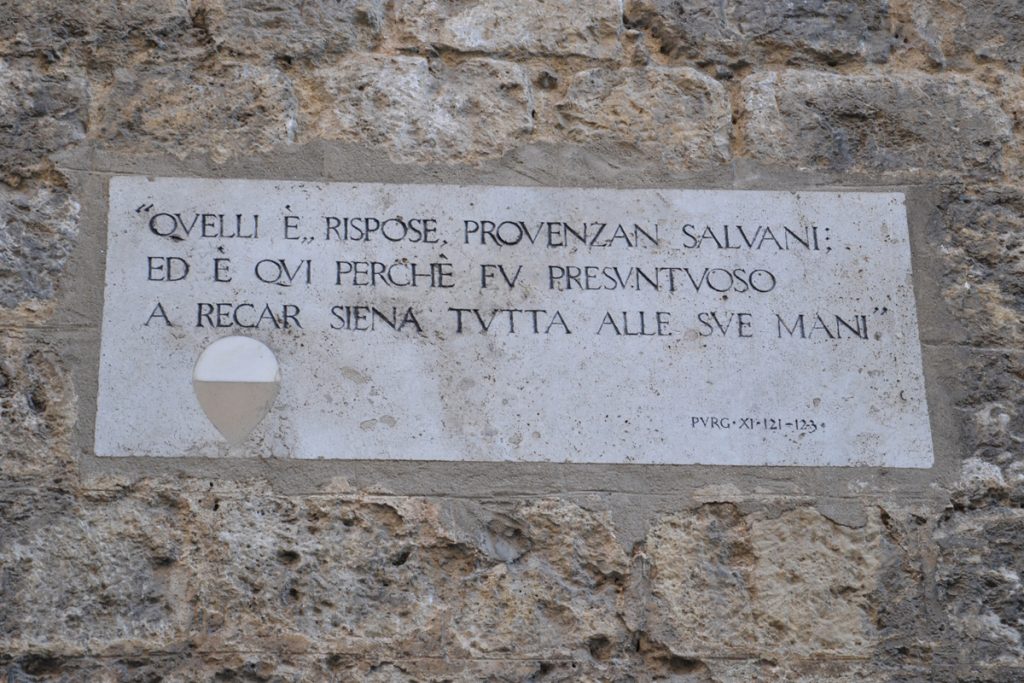
On the fourth stone we can read:
«Quelli è», rispose, «Provenzan Salvani;
Purgatorio XI, vv. 121-123
ed è qui perché fu presuntuoso
a recar Siena tutta alle sue mani.
of whom you spoke now?” “Provenzan Salvani,
Purgatory XI, vv. 121-123
he answered, “here because-presumptuously-”
he thought his grip could master all Siena.
The poet speaks about Provenzano Salvani, a Sienese Ghibelline leader whose role was decisive in the victory of the Battle of Montaperti against the Guelphs of Florence. Salvati was born in 1220 and died in 1267, but with his deeds he managed to acquire such power that he became, in fact, lord of Siena.
His name is linked to the celebration, in Siena, of the Madonna of Provenzano.
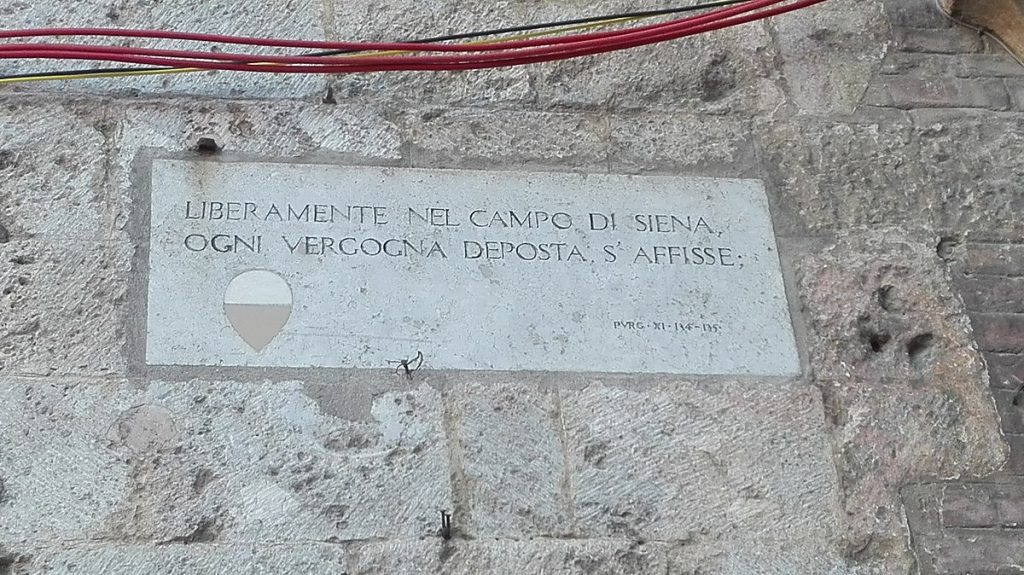
On the fifth stone we can read:
Liberamente nel Campo di Siena,
Purgatorio XI, vv. 134-135
ogni vergogna deposta, s’affisse;
Then of his own free will he set
Purgatory XI, vv, 134-135
aside all shame and took his place upon the Campo of Siena;
During the battle of Tagliacozzo (1268) Bartolomeo Seracini, a friend of Provenzano Salvani, was captured; Seracini could be freed by paying a bounty of 10,000 florins, but Salvani did not have enough money. The Sienese leader then decided, putting aside “every shame” to go and ask for public help in Piazza del Campo.
Despite this gesture, Salvani ended up among the prouds in the Purgatory.
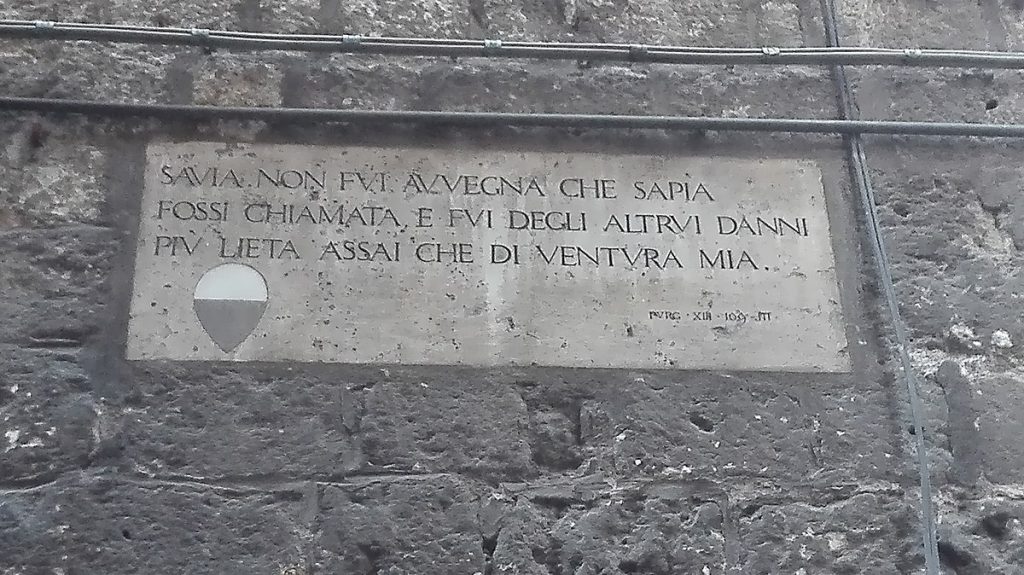
On the sixth stone we can read:
Savia non fui, avvegna che Sapìa
Purgatorio XIII, vv. 109-111
fossi chiamata, e fui de li altrui danni
più lieta assai che di ventura mia
I was not sapient, though I was called Sapia;
Purgatory XIII, vv. 109-111
and I rejoiced far more at others’ hurts
than at my own good fortune.
Dante is in the second frame where the souls of the envious expiate. Among them he meets Sapìa Salvani, aunt of Provenzano Salvani: this woman felt such great envy towards her fellow citizens that she felt satisfaction when the Ghibellines were defeated in the battle of Colle di Val d’Elsa in 1269, to which the woman witnessed in person. It was in this battle that her nephew Provenzano died.
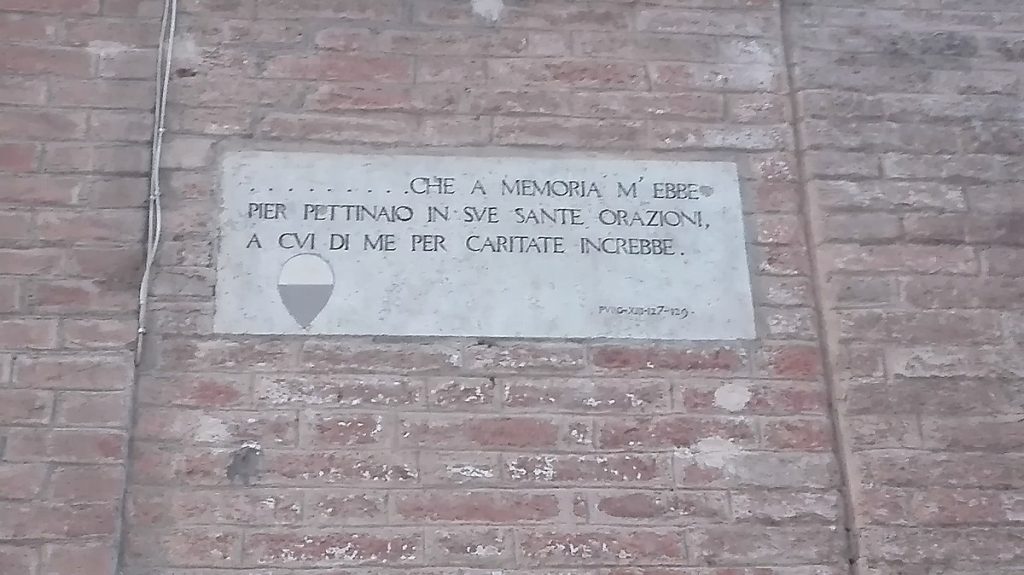
On the seventh stone we can read:
…ch’a memoria m’ebbe
Purgatorio XIII, vv. 127-129
Pier Pettinaio in sue sante orazioni,
a cui di me per caritate increbbe
one who was sorrowing for me because
Purgatory XIII, vv. 127-129
of charity in him — Pier Pettinaio —
remembered me in his devout petitions.
Pietro da Campi, also called Beato Pier Pettinaio, lived in Siena in 1200 and he was then beatified in 1802. This man is named by Sapìa Salvani, the woman Dante is talking to and who is one of the envious due to the hatred he had towards Siena when he was alive, of which he only repented at the point of death. Sapìa speaks of the man as the one who, thanks to his prayers, made his stay in Antipurgatory shorter.
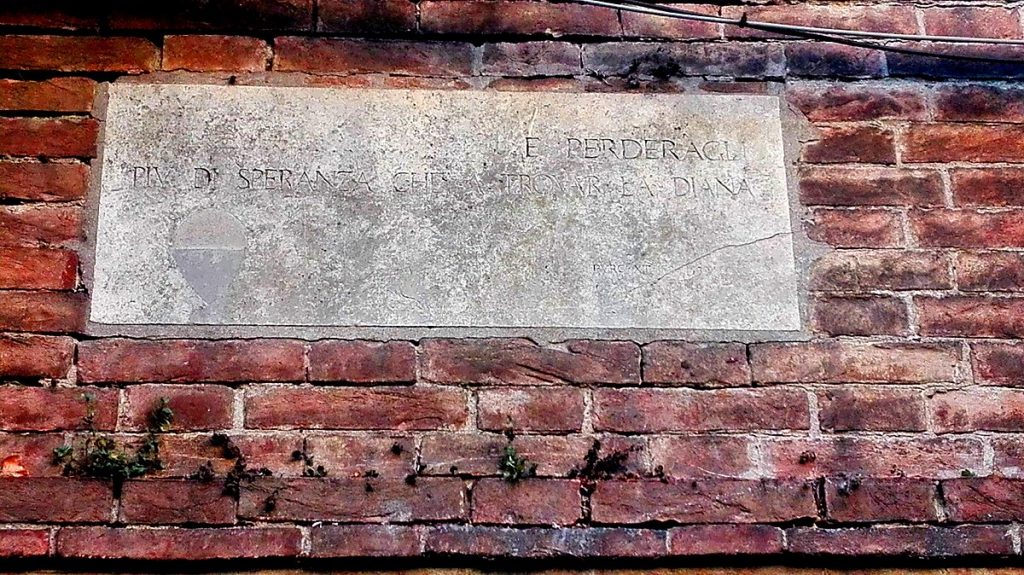
On the eighth stone we can read:
… e perderagli
Purgatorio XIII, vv. 152-153
più di speranza che a trovar la Diana
… their loss
Purgatory XIII, vv. 152-153
in hope will be more than Diana cost
The poet, with these verses, refers to two failures in which Siena and its republic were the protagonists, comparing the events of the port of Talamone to the vain search for the Diana, the legendary underground river of Siena. Talamone was the first port of the Republic of Siena, but it was remembered for being attacked by pirates and plague: for this reason Dante writes that the “those vain ones who have put their trust in Talamone” will lose hope as they lost it because the Diana was not found.
Nice Places ti porta alla scoperta dei luoghi di interesse presenti nelle tue vicinanze, raccontandoti brevemente la loro storia e le loro caratteristiche.
Scarica adesso l’app per Android dal Play Store!

